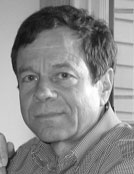

![]()
These three new books by faculty at the MIT School of Humanities, Arts, and Social Sciences have found broad audiences and received critical acclaim in the past academic year. All three authors occupy prominent positions in the world of contemporary letters, and their latest works have been greeted by enthusiastic reviews.
David works in a bank, lives in a rooming house, and enjoys reading and quiet walks. But this man of modest means and ambition loses his job unexpectedly and winds up finding temporary work in a mortuary. One day, David sees a mysterious "vapor" coming from a dead body—an experience that catapults him out of his humdrum life, and causes him to question all that he believes. This character's wrenching and remarkable journey in Alan Lightman's novel Ghost explores the boundaries of the physical and spiritual worlds, and the divide between science and religion.

Alan Lightman, an adjunct professor of Humanities at MIT, is best known for his 1993 novel Einstein’s Dreams, an international bestseller that has been translated into thirty languages. Early in his career, Lightman—who trained as an astrophysicist and research scientist—also published poetry in literary magazines and wrote about the human side of science. His essays appeared in Smithsonian magazine, The New Yorker, and many other journals and magazines. Lightman came to MIT in 1989, when he was appointed professor of science and writing, and senior lecturer in physics.
As both a distinguished physicist and an acclaimed novelist, Lightman is one of a very small number of people who have achieved mastery in both both science and literature. In 2002, he stepped down from his MIT chair, and became an adjunct professor to allow more time for his writing.
According to Lightman, Ghost continues a theme found in many of his earlier novels and essays: the clash between the rational world and the intuitive world. "In Ghost, it comes out as either belief in the supernatural, or rejection of the supernatural," he says. "One of the issues that certainly motivated me in writing the book was the confrontation between science and religion, and the different ways of thinking that those two huge disciplines represent."
Why does a cello inspire a meditation on fatherhood? What does a yellow raincoat have to do with core feelings of isolation, insecurity, and fears of death and life? How does an apple capture both the simplicity and complexity of the world? "We think with the objects we love; we love the objects we think with," says Sherry Turkle, who explores the meaning that everyday things have for several dozen authors in a collection of essays she edited, Evocative Objects: Things We Think With.

Sherry Turkle is a licensed clinical psychologist and a professor of Social Studies of Science and Technology in MIT’s Program in Science, Technology, and Society. In her research and writing, Turkle has focused on the psychology of people’s relationships with technology. She is founder and current director of the MIT Initiative on Technology and Self, a center of research and reflection on the evolving connections between people and artifacts.
Turkle is the author of several earlier books, including The Second Self: Computers and the Human Spirit, which focuses on one-to-one relationships humans have with computers, and Life on the Screen: Identity in the Age of the Internet, an exploration of the computer as an intermediary. Her latest book, Evocative Objects, is the first in a planned trilogy in the power of objects. The second book will deal with objects that help attract students to science, and the third book will offer an "inner history" of technology and a look at the sometimes hidden meanings of devices.
Of Evocative Objects—which has been featured in publications as diverse as The New York Times, The Washington Post, The New Scientist, and I.D. Magazine—Turkle says, "This book makes the case for the importance of objects that bring philosophy down to earth. It dramatizes that thinking about objects is a way to bring thought and feeling together, because they naturally come together when we reflect on objects."
In The Brief Wondrous Life of Oscar Wao, Junot Díaz follows a Dominican-American man in New Jersey on a harrowing journey through life, exploring the burdens of family history and the meanings of a multinational heritage. Oscar de Leon, a nerd dubbed "Oscar Wao" by bullies who liken him to Oscar Wilde, is a poignant character whose life story is set against the political histories of the Dominican Republic and the United States.

For Junot Díaz, an associate professor in the Program in Writing, The Brief Wondrous Life of Oscar Wao is his first novel, and a triumphant and much-anticipated follow-up to his first book, Drown, a 1996 collection of coming-of-age stories set in Santo Domingo and New Jersey. A literary sensation, Drown thrust Díaz, then 27, into the spotlight; he was heralded as one of Newsweek’s "New Faces of 1996," and the book received the PEN/Malamud Award for short fiction, the Lila Wallace-Reader’s Digest Writers Award, and the Pushcart Prize.
Díaz's work has been published in The New Yorker, The Paris Review, and Glimmer Train. Regarded as one of the seminal Latino and American fiction writers, Díaz came to MIT in 2003 from Syracuse University, where he taught for five years.
Speaking about the transition from writing short stories to a novel, Díaz says, "In short stories, you’re always looking to take things out. In a novel, it’s the opposite. A short story you can hold in your head entirely, but a novel spins through you like a film loop, so you can only hold a bit of it at a time. It’s more an act of trust than one of control."